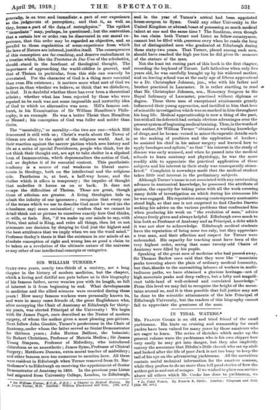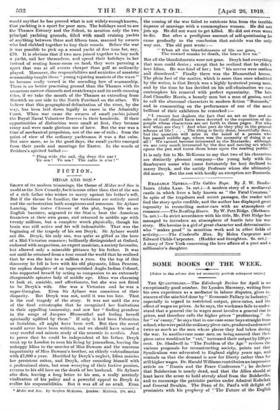IN TIDAL WATERS.*
Me. FRANCIS COOTIE is an old and tried friend of the small yachtsman. His hipts on cruising and seamanship for small yachts have been valued for many years by those amateurs who are eager to learn. The series, of sketches which make up the present volume warn the yachtsman who is his own skipper how very easily he may get into danger, but they also implicitly convey the assurance that Dibdin's little cherub who eat up aloft and looked after the life of poor Jack is not too busy to keep the tail of his eye on the adventuring yachtsman. All the narratives contain useful technical information for the amateur seaman, while they profess to do no more than tell good stories of how the author got in and out of scrapes. If we wished to place one service above all others which Mr. Cooke has done to yachtsmen, we • In Tidal Waters. By Brandi B. Cooke. London: Chapman and. HAIL [12a. ad. net.] would say that he has proved what is not widely enoughknown, that yachting is a sport for poor men. The holidays used to see the Thames Estuary and the Solent, to mention only the two principal yachting grounds, filled with email cruising yachts of anything between three and fifteen tons, manned by owners who had clubbed together to buy their vessels. Before the war it was possible to pick up a sound yacht of five tons for, say, £70. It is obvious that if two men joined together to buy such a yacht, sail her themselves, and spend their holidays in her instead of renting house-room on land, they were pursuing a sport that was at all events cheaper than golf as ordinarily played. Moreover, the responsibilities and anxieties of amateur seamanship taught these " young rejoicing masters of the wave " to become really versed in the unending lore of seamanship. There is no better practising ground than the Thames with its numerous narrow channels and swatchways and its swift-running tides, if we take the mouth of the Thames as extending from Harwich on one side to the North Foreland on the other. We believe that this geographical delimitation of the river, by the way, has been laid down legally in cases in the Admiralty Court. When war came the owners of saran yachts joined the Royal Naval Volunteer Reserve in their hundreds. If their opportunities of distinction were small at first, they became many and were made glorious use of later. But the war was a time of mechanical propulsion, not of the use of sails ; from the point of view of the ordinary yachtsman it was a flat calm. But once more,- as in the good days, the small yachts emerged from their yards and moorings for Easter. In the words of Beddoeis spirited ballad :-
" Fling wide the sail, dig deep the oar To sea ! To sea ! The calm is o'er !"







































 Previous page
Previous page